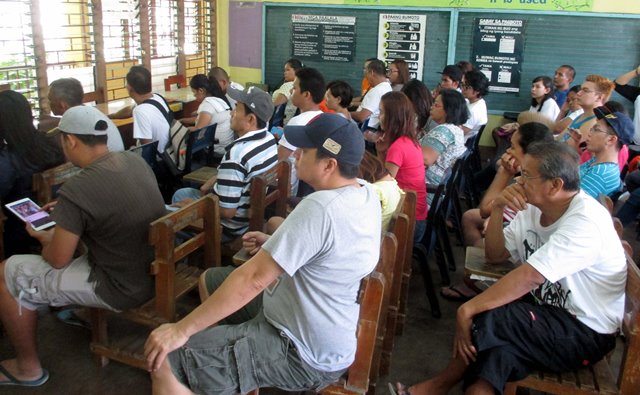‘Dagdag-Bawas’: Debunking Poll Fraud Claims

Voters patiently wait for their turn to vote in the holding area in a school located in Project 7, Quezon City. Photo by Lito Ocampo
CHEERS TO Rappler for analyzing and debunking claims of fraud by alleged whistleblowers who claim to have been involved in the “dagdag-bawas” or vote shaving that allegedly occurred in a warehouse in Lucena, Quezon, on Election Day.
The allegations surfaced as Congress was in the process of proclaiming Davao City Mayor Rodrigo Duterte and Camarines Sur Third District Representative Leni Robredo as president and vice-president, respectively. The first claim came from a man identified only as “Ka Bert,” whom initial reports described as a “municipal hall official” and a “self-confessed operator in vote-rich Quezon.” Two others claimed that they, too, were involved in the fraud in favor of Liberal Party candidates. Three persons who sought an audience with some senators failed to present evidence to back their claims. It was not clear, however, if Ka Bert was among the three.
These individuals were accompanied by Council of Philippine Affairs secretary-general Pastor “Boy” Saycon, an ally turned critic of outgoing President Benigno Simeon Aquino III. Saycon has been involved with many political figures and controversies, such as the late Sulu Sultan Jamalul Kiram III, whose men figured in a standoff with Malaysian security troops in 2013 in a bid to press their claim on Sabah. He was one of Kiram’s “political advisers” then. Saycon also joined the massive rally launched by Iglesia ni Cristo members in August 2015 to protest the alleged meddling of the Department of Justice, particularly by then Justice Secretary and now Senator Leila de Lima, in the affairs of their church.
Rappler’s “’Poll cheating’ in Quezon: Did Saycon’s witnesses change story?” published on May 31 dissected the witnesses’ claims on the alleged rigging of votes to benefit the Mar Roxas and Robredo. The article pointed out inconsistencies in the supposed number of votes added to Roxas and Robredo and the votes shaved from their rivals, particularly from Senator Ferdinand Marcos Jr. who has been very vocal about the alleged poll fraud.
To prove the improbability of the claims, the article highlighted how the numbers claimed to have been added and reduced by the witnesses did not tally with either the official or unofficial tallies, as well as the total number of voters who actually voted in Quezon.
Besides showing the inconsistencies, the same report also raised questions the supposed whistleblowers must answer in order to prove their allegations: what specific results were manipulated; at what point on Election Day was the fraud committed; the number of precincts affected; and how they were able to intercept the vote transmissions. This was followed by a brief explanation of how the automated election system works.
Claims of electoral fraud made in the press by vested interest groups are often never verified. Rigorous reporting on these allegations of election cheating, to check and counter-check claims, are important to ensure that Philippine elections remain free, honest and credible.
Leave a Reply